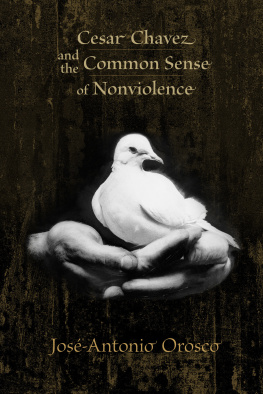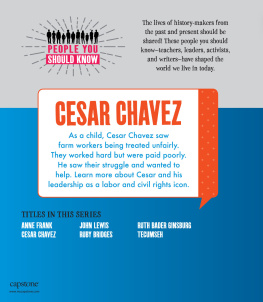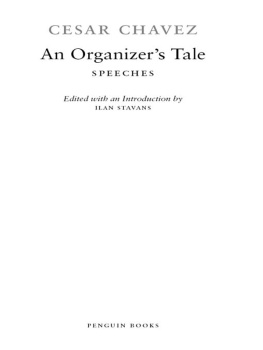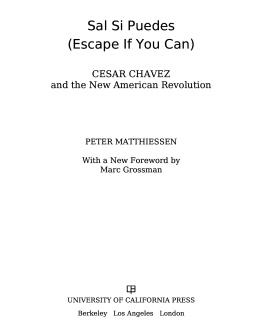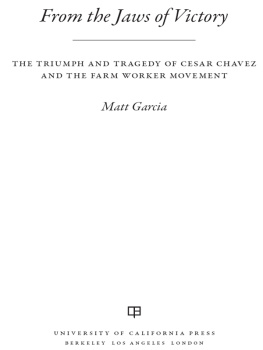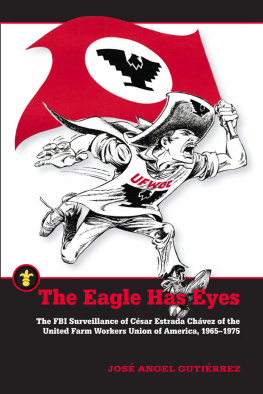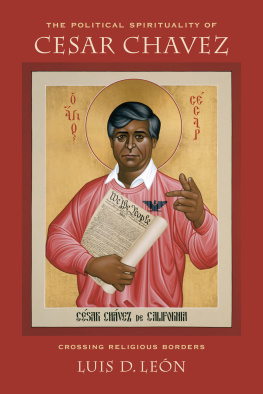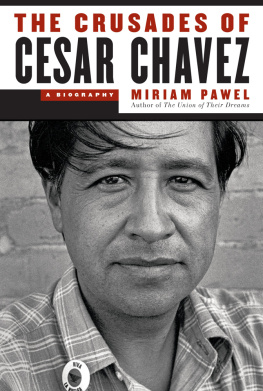José-Antonio Orosco - Cesar Chavez and the Common Sense of Nonviolence
Here you can read online José-Antonio Orosco - Cesar Chavez and the Common Sense of Nonviolence full text of the book (entire story) in english for free. Download pdf and epub, get meaning, cover and reviews about this ebook. year: 2008, publisher: UNM Press, genre: Politics. Description of the work, (preface) as well as reviews are available. Best literature library LitArk.com created for fans of good reading and offers a wide selection of genres:
Romance novel
Science fiction
Adventure
Detective
Science
History
Home and family
Prose
Art
Politics
Computer
Non-fiction
Religion
Business
Children
Humor
Choose a favorite category and find really read worthwhile books. Enjoy immersion in the world of imagination, feel the emotions of the characters or learn something new for yourself, make an fascinating discovery.
- Book:Cesar Chavez and the Common Sense of Nonviolence
- Author:
- Publisher:UNM Press
- Genre:
- Year:2008
- Rating:5 / 5
- Favourites:Add to favourites
- Your mark:
- 100
- 1
- 2
- 3
- 4
- 5
Cesar Chavez and the Common Sense of Nonviolence: summary, description and annotation
We offer to read an annotation, description, summary or preface (depends on what the author of the book "Cesar Chavez and the Common Sense of Nonviolence" wrote himself). If you haven't found the necessary information about the book — write in the comments, we will try to find it.
Cesar Chavez and the Common Sense of Nonviolence — read online for free the complete book (whole text) full work
Below is the text of the book, divided by pages. System saving the place of the last page read, allows you to conveniently read the book "Cesar Chavez and the Common Sense of Nonviolence" online for free, without having to search again every time where you left off. Put a bookmark, and you can go to the page where you finished reading at any time.
Font size:
Interval:
Bookmark:


All rights reserved. Published 2008
Printed in the United States of America
14 13 12 11 10 09 08 1 2 3 4 5 6 7
Cesar Chavez and the common sense of nonviolence / Jos-Antonio Orosco.
p. cm.
Includes bibliographical references and index.
ISBN 978-0-8263-4375-8 (cloth : alk. paper)
1. Chavez, Cesar, 19271993.
2. Labor leadersUnited States.
3. Non violence.
I. Title.
HD6509.C48O76 2008
331.88'13092dc22
[B]
2007043180
Composed in 10.5/13.5 Minion Pro
 Display type is Brioso Pro
Display type is Brioso ProCesar Chavez as a Political Thinker
Pilgrimage, Penitence, and Revolution:
The Logic of Nonviolence
The Most Vicious Type of Oppression:
The Broken Promises of Armed Struggle
The Strategies of Property Destruction
and Sabotage for Social Justice
Refusing to Be a Macho:
Decentering Race and Gender
The Common Sense of Nonviolence:
Time and Crisis in King and Chavez
 I owe a great deal of gratitude to many individuals whose generosity and insight helped me to complete this book. Andrew Valls, Lani Roberts, Tony Vogt, Lisa Gonzales, and Erlinda Gonzales-Berry, all colleagues and friends at Oregon State University (OSU), read drafts and shared with me books, articles, and their enthusiasm for the project. Greg Moses, Scott Pratt, Gail Presby, Lisa Heldke, Barry Gan, and Kim Diaz were all kind enough to spend time with my writing and give me their honest opinions. Marta Kunecka read the entire manuscript, shared her ideas, and graciously helped me to prepare the index. I also wish to thank audiences at the Society for the Advancement of American Philosophy, Concerned Philosophers for Peace, the Society for Philosophy in the Contemporary World, the Gandhi/King Society, the National Association of Chicana/o Studies, the University of CaliforniaRiverside Philosophy Department, and the OSU Ethnic Studies Department for probing questions and helpful suggestions on improving the work. In particular, I would like to thank the University of New Mexico Press staff for their skill and judgment in guiding me through the process of finishing the book.
I owe a great deal of gratitude to many individuals whose generosity and insight helped me to complete this book. Andrew Valls, Lani Roberts, Tony Vogt, Lisa Gonzales, and Erlinda Gonzales-Berry, all colleagues and friends at Oregon State University (OSU), read drafts and shared with me books, articles, and their enthusiasm for the project. Greg Moses, Scott Pratt, Gail Presby, Lisa Heldke, Barry Gan, and Kim Diaz were all kind enough to spend time with my writing and give me their honest opinions. Marta Kunecka read the entire manuscript, shared her ideas, and graciously helped me to prepare the index. I also wish to thank audiences at the Society for the Advancement of American Philosophy, Concerned Philosophers for Peace, the Society for Philosophy in the Contemporary World, the Gandhi/King Society, the National Association of Chicana/o Studies, the University of CaliforniaRiverside Philosophy Department, and the OSU Ethnic Studies Department for probing questions and helpful suggestions on improving the work. In particular, I would like to thank the University of New Mexico Press staff for their skill and judgment in guiding me through the process of finishing the book. DURING THE 2006 WORLD CUP, AMERICAN CORPORATIONS TRIED to tap into the increasingly lucrative Latino/a market with television commercials, in Spanish, that acknowledge their presence in the United States. One beer commercial juxtaposes images of traditional American city scenes with their new Latinized vistas. In one particular example, a street sign reading Main Street fades and quickly reemerges as Cesar Chavez Ave., suggesting that Latinos/as are literally altering civic landscapes with symbols, images, and colors that reflect a new sense of culture and history. These television advertisements appeared after the May 2006 Day without an Immigrant demonstrations in which millions of Latinos/as and their supporters marched in major American cities to support immigrant rights and to defeat punitive immigration bills passed in the House of Representatives in December 2005. Although the marches touched off heated debates about undocumented workers and the cultural elements essential to American national identity, these World Cup commercials seemed to recognize that Latinos/as will be permanent fixtures of American life.
DURING THE 2006 WORLD CUP, AMERICAN CORPORATIONS TRIED to tap into the increasingly lucrative Latino/a market with television commercials, in Spanish, that acknowledge their presence in the United States. One beer commercial juxtaposes images of traditional American city scenes with their new Latinized vistas. In one particular example, a street sign reading Main Street fades and quickly reemerges as Cesar Chavez Ave., suggesting that Latinos/as are literally altering civic landscapes with symbols, images, and colors that reflect a new sense of culture and history. These television advertisements appeared after the May 2006 Day without an Immigrant demonstrations in which millions of Latinos/as and their supporters marched in major American cities to support immigrant rights and to defeat punitive immigration bills passed in the House of Representatives in December 2005. Although the marches touched off heated debates about undocumented workers and the cultural elements essential to American national identity, these World Cup commercials seemed to recognize that Latinos/as will be permanent fixtures of American life.Font size:
Interval:
Bookmark:
Similar books «Cesar Chavez and the Common Sense of Nonviolence»
Look at similar books to Cesar Chavez and the Common Sense of Nonviolence. We have selected literature similar in name and meaning in the hope of providing readers with more options to find new, interesting, not yet read works.
Discussion, reviews of the book Cesar Chavez and the Common Sense of Nonviolence and just readers' own opinions. Leave your comments, write what you think about the work, its meaning or the main characters. Specify what exactly you liked and what you didn't like, and why you think so.

